Really excited for PASEDB2025 in July!
17.06.2025 17:38 — 👍 1 🔁 0 💬 0 📌 0
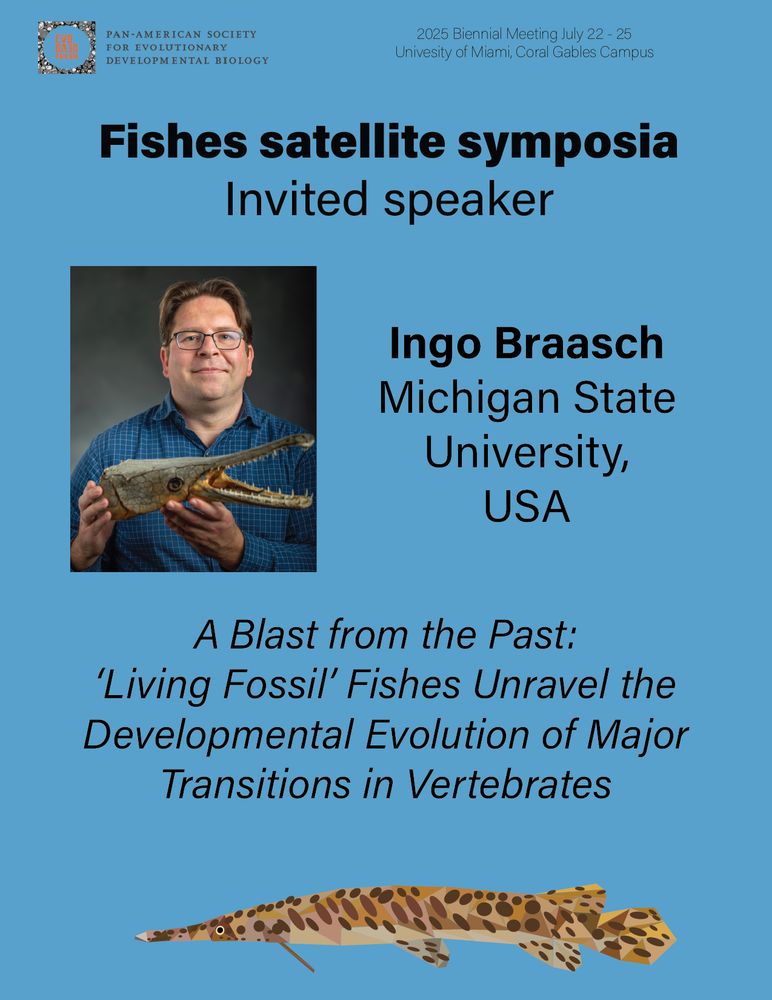
🐟 I’ve been herring all about it!
Fish satellite symposia speaker talks at #PASEDB
Invited speaker: @fishevodevogeno.bsky.social
Organizers: @nakamuralab.bsky.social @patyschneider22.bsky.social & Joaquín Letelier
Register: evodevo.wildapricot.org/event-6007396
06.06.2025 15:03 — 👍 17 🔁 5 💬 0 📌 1
The Pan American Society for Evolutionary Developmental Biology - 2025 Biennial Meeting of the Pan American Society for Evolutionary Developmental Biology
🌟Remember to register #PASEDB 2025 Biennial Meeting (July 22-25)!
We have an incredible line up of activities and speakers, including 4 satellite symposia (July 22): Spiralia🐌, Arthropods🦋, Fishes🐟 and Non-bilaterian 🪸
Register and submit today!
evodevo.wildapricot.org/event-6007396
21.05.2025 12:30 — 👍 2 🔁 2 💬 0 📌 0
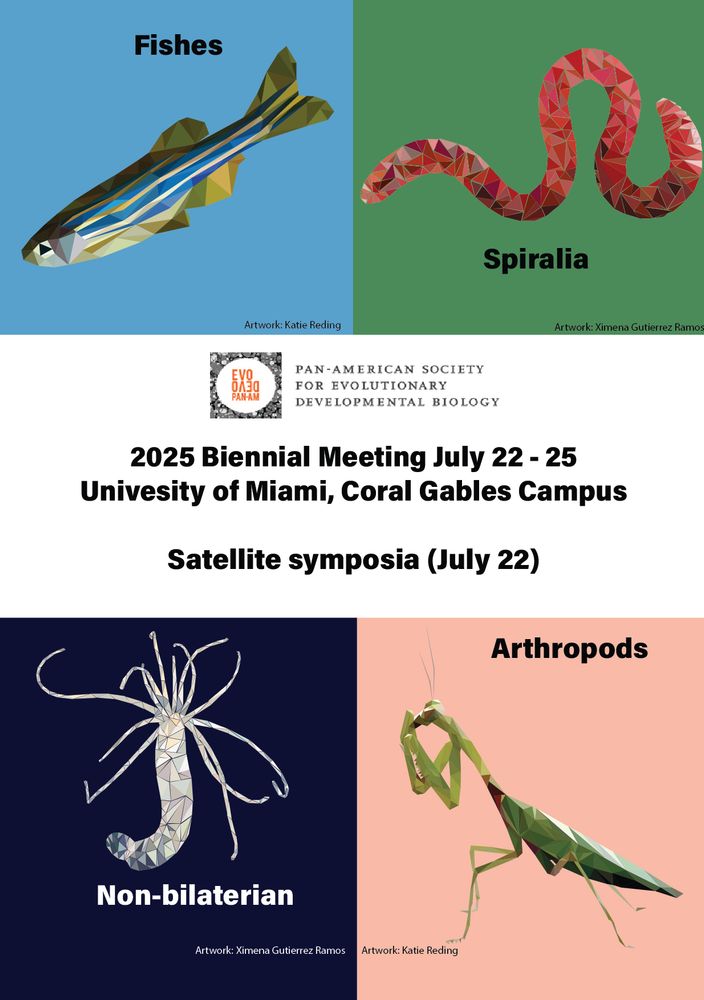
🌟We have great satellite meetings!🥳😎
- Spiralia 🐌🪱
- Arthropods 🦋🦗🪰🪳
- Fishes🐠🐟🐡
- Non-bilaterian 🪼🪸
Remember to register here: evodevo.wildapricot.org/event-6007396
#evodevo #pasedb #science
09.05.2025 20:23 — 👍 9 🔁 3 💬 0 📌 1
Thanks so much Amber! Hope you are having an awesome time in your postdoc!
30.10.2024 18:06 — 👍 1 🔁 0 💬 0 📌 0
BTW our bad - Gavin's handle is @gavinrrice.bsky.social
28.10.2024 19:33 — 👍 0 🔁 0 💬 0 📌 0
Thank you to the O'Connor-Giles lab for updating the incredible CRISPR Optimal Target Finder to include D. eugracilis. @bdsc.bsky.social for lines, and @flybase.bsky.social for being our favorite database
28.10.2024 19:32 — 👍 1 🔁 0 💬 0 📌 0
We want to thank our amazing collaborators Julia Zeitlinger and Tatiana Gaitan. We cannot wait to share more as we continue to dive deeper into how the trichome genetic network has specialized!
28.10.2024 19:30 — 👍 0 🔁 0 💬 1 📌 0

Schematic representation of the origin and specialization of the D. eugracilis aedaegal sheath trichomes and its genetic network
Our results demonstrate the power of genetic network co-option to redeploy a genetic network into a new tissue context. Yet, novelties are more than mere iterations of repeated structures. We reflect on how they derive unique features by elaborating their network architecture.
28.10.2024 19:29 — 👍 0 🔁 0 💬 1 📌 0
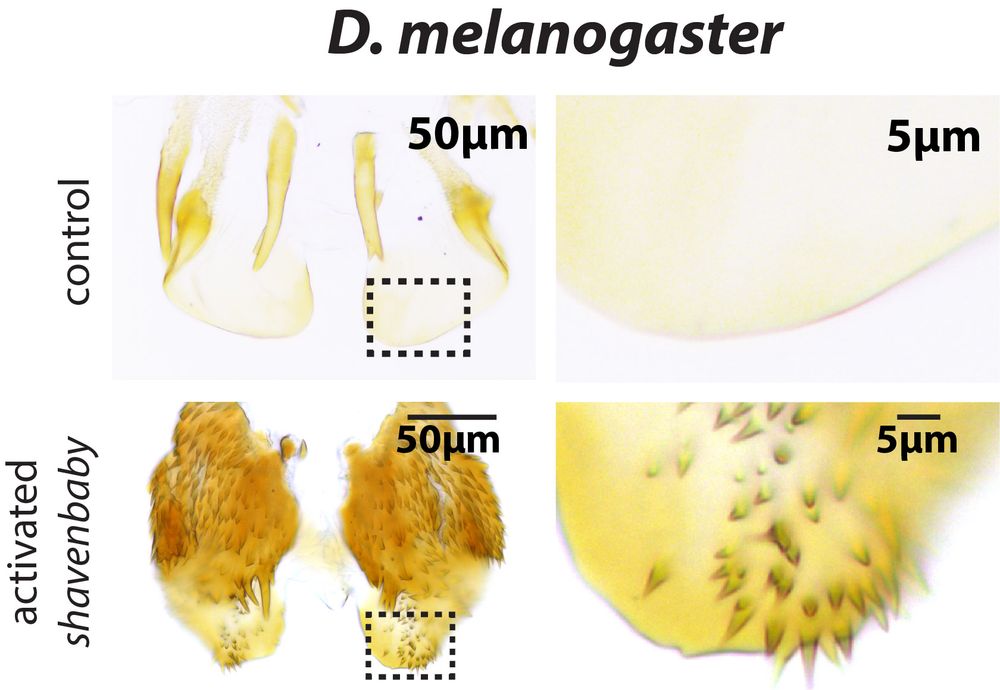
induction of ectopic trichomes in D. melanogaster by mis-expressing shavenbaby.
Misexpression of the active form of shavenbaby in the naïve aedeagal sheath of D. melanogaster was sufficient to induce small trichomes.
This is one of the first times that genetic network co-option has been recapitulated through experimental manipulations.
28.10.2024 19:27 — 👍 0 🔁 0 💬 1 📌 0

adult aedaegal sheaths of D. eugracilis control and shavenbaby CRISPR treatments which reduced height of the largest trichomes.
Disruption of shavenbaby via mosaic CRISPR caused the truncation of trichome height, showing the important role of shavenbaby, but also indicating that there are likely other redundant transcription factors as well
28.10.2024 19:26 — 👍 0 🔁 0 💬 1 📌 0
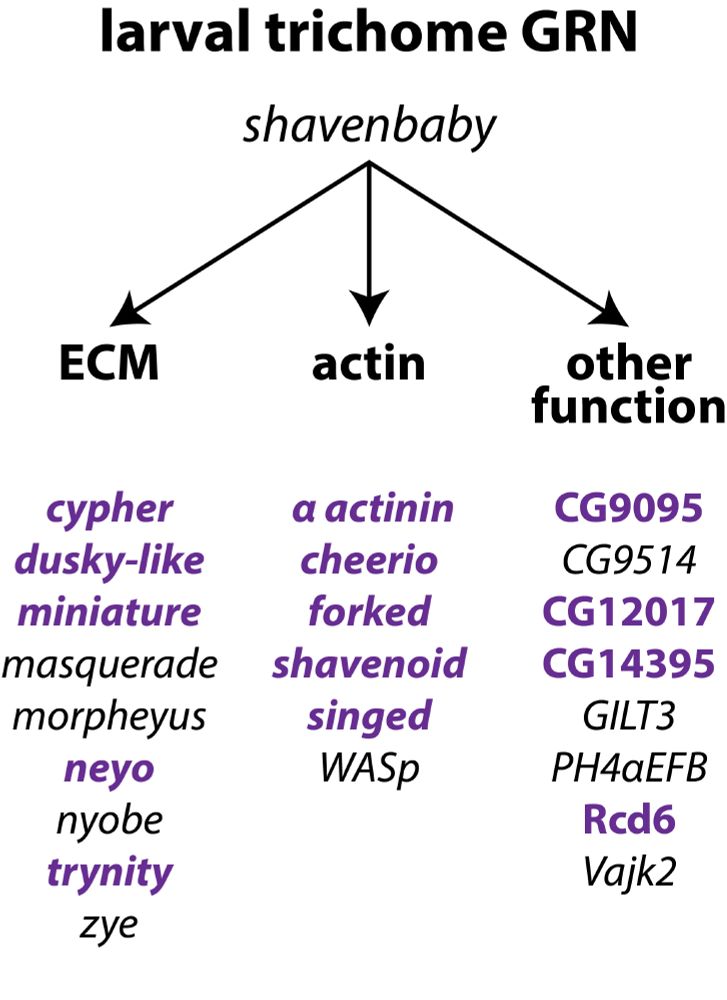
shavenbaby GRN showing multiple downstream functions (ECM, actin and "other".
Additionally, we find that the trichome genetic network was partially co-opted into the aedeagal sheath as 14 (purple) out of 23 direct targets of shavenbaby we tested have gained expression in the D. eugracilis aedeagal sheath
28.10.2024 19:26 — 👍 0 🔁 0 💬 1 📌 0

expression of shavenbaby protein (top) and mRNA (bottom) in D. melanogaster (no expression in the sheath) and D. eugracilis (expression in the sheath - outlined)
The novel unicellular outgrowths of D. eugracilis have evolved expression of the key trichome transcription factor shavenbaby, named for its mutant phenotype, in which trichome morphology is disrupted
28.10.2024 19:25 — 👍 0 🔁 0 💬 1 📌 0
We found that each of these outgrowths develop as an actin-rich (magenta) extension of a single cell (apical cell junctions grey), similar to trichomes, hair-like structures that cover the larvae and much of the adult cuticle
28.10.2024 19:24 — 👍 0 🔁 0 💬 1 📌 0

The adult aedeagal sheaths of D. pseudoobscura, D. ananassae, D. melanogaster, and D. eugracilis (which is the only species with a variety of differently sized outgrowths).
We developed the rapidly evolving drosophilid terminalia as a model to explore the genetic basis of novelty. D. eugracilis has over 150 differently sized outgrowths on its aedeagal sheath which appear to be absent from other species of Drosophila, including D. melanogaster.
28.10.2024 19:23 — 👍 0 🔁 0 💬 1 📌 0
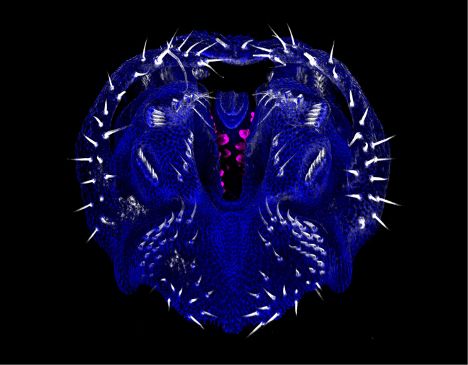
3D micrograph of the developing D. eugracilis terminalia
Our new @CurrentBiology paper provides a rare glimpse into a morphological novelty in Drosophila eugracilis
In it, @gavinrrice and colleagues, infer and reproduce the likely initial steps of a novelty's formation
www.sciencedirect.com/science/arti...
28.10.2024 19:20 — 👍 16 🔁 9 💬 2 📌 1
Master’s student in Entomology at WUR (NL); former water strider taxonomist; now pursuing research in Evo-Devo, with a strong interest in uncovering the molecular mechanisms underlying fascinating traits across insects.
We explore how evolution, ecology and biological clocks interact,
with a focus on lunar rhythms in development and reproduction
of the marine insect Clunio.
+ Genomics | Biodiversity | Behaviour | NeuroBio | MolBio | SciCom
bit.ly/KaiserLab
Decoding how the gut thinks 🦠🪱🧠💪
Neuroscientist with interests in
#EnergyMetabolism #EntericNeurons #Fats
@crick.ac.uk @institutducerveau.bsky.social
Chromosome biology, evolutionary genetics, sex chromosomes, holocentric chromosomes, meiosis, butterflies,...
Assistant Professor uOttawa
Associate Editor BMCBiology
Principal Investigator - Tata Memorial Centre - ACTREC, Mumbai, India
Developmental Biology & Disease mechanisms!
Researcher @Kyoto University
Evo Devo, Insect Morphology, Cuticle Nanocrystals, enjoy insect hunting at a riverbed with my children
Assistant professor at University of Dayton. Evolution, Anatomy, Development, Natural History, Amphibians & Reptiles | https://www.paluhlab.com/
PhD student in the Moczek lab
EvoDevo | Novelty | Plasticity
🦋📸 https://www.instagram.com/choiy_pic?igsh=Z2k3djBicm90d2gy&utm_source=qr
evo devo + philosophy of science enthusiast
working on horned beetles and beetle horns
IU Biology PhD student | she/her
Evolutionary biologist; Lewis-Sigler Scholar @ Princeton. Formerly @ Harvard.
Sensory biology, genetics, behavior, and evolution (especially in the Twilight Zone) | Incoming Assistant Professor, NJIT Biological Sciences (Fall '26) | Current postdoc, University of Lausanne, Benton Group
https://himmellab.org
Interested in RNA-binding proteins, microbiology, translation regulation, coral reefs...PhD student @PittBioSci. Previously at @RuiaMicro, @chg_bng
Website: https://t.co/BI3eOwEvL1
Biologist
Institute of Biology Valrose
Nice, France
http://ibv.unice.fr/research-team/braendle/
Graduate student @mtleelab.bsky.social U Pitt - Evolution of post-transcriptional gene regulation in animal early embryonic development
Project Assistant @ Neuronal Systems Lab, University of Hyderabad.
Exploring the neuroscience of behavior through honeybees 🐝
Electrophysiology, Tetrodes, Spike sorting, modelling etc..
Passionate about neural coding and information processing.
Biology and Neuroscience professor at a small liberal arts college. Views expressed are my own.
Interested in the genetic and cellular mechanisms behind the evolution of insect wings.
Molecular Biologist, PhD Candidate in the @arnonelab.bsky.social at @szndohrn.bsky.social. Evodevo & Echinoderms lover.









